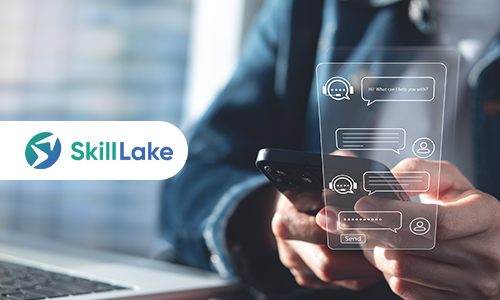Franchise success through training: Why you need a Franchise LMS

Ever wondered how some small businesses turn into big franchises? Simply because they have a great product, strong brand, or sizable investment? Beyond all these, there’s a secret sauce to their success. Any guesses? You read it right! The magical component is nothing but effective franchise training. Data shows that franchise training improves product awareness (70%) and customer relationships (60%).
Picture this. You’ve come up with a great training program for your franchise partners. How about rendering it to them? That’s when you need a learning management system software (LMS). How does a franchise LMS improve the effectiveness of your training? What are the key factors to consider when implementing a franchise LMS? This article is your essential guide to selecting the right franchise LMS.
In this article:
- Why choose an LMS for franchise training?
- Benefits of using a franchise LMS
- Must-have features in a franchise LMS
- Considerations for choosing a franchise LMS
- Final thoughts
Why Choose an LMS for Franchise Training?
Technology is the biggest driver of efficiency in franchise training. 80% of companies say technology helps enhance the effectiveness of their franchise training. 60% of businesses state using a franchise training LMS to train their franchisees.
A modern LMS for franchise helps solve the common challenges in training, such as:
- Inconsistency in training franchisees across various locations
- Lack of appropriate methods to measure the efficiency and impact of franchise training
- Difficulties in tracking course completion status and progress made by learners
- Outdated training materials that can make franchisees less competitive and relevant
- Spending more time, money, and resources to create courses or update training materials
- Manual effort (administrative workload) involved in content structuring and course creation
- Lack of personalized (customized) learning content catering to individual or team needs
- Risks of non-compliance among franchise staff that can affect your operations and credibility
- Inability to scale franchise training programs to accommodate new locations and participants
How does a franchise LMS solve these challenges? Read on.
What Are the Benefits of a Franchise LMS?
A franchise LMS enhances your extended enterprise learning. It helps deliver, track, and manage training content across your franchise network. Here are the benefits of using a franchise LMS:
1. Boost Brand Recognition
A franchise LMS plays an important role in building brand recognition by:
- Providing standardized, consistent training to all franchisees across many locations
- Onboarding new franchise staff and aligning them with the brand’s values and cultures
- Keeping franchisees up-to-date with the latest skills and knowledge required to excel in their roles
2. Flexible Learning Options
A modern LMS makes learning more flexible and convenient for franchise professionals.
- Cloud-based hosting ensures instant access to courses and training materials. Learners can access their courses anytime on an internet-connected device.
- Mobile learning promotes learning on the go. Learners can take up courses even during breaks and non-working hours.
3. Motivate and Engage Franchise Staff
An LMS incorporates various engaging activities to make training more interesting for learners.
- Gamification to motivate franchise staff to meet their learning goals faster
- Certification to ensure the legitimacy of courses and credibility earned by franchisees
- Learning feeds and microlearning bytes for users to receive and digest information faster
4. Reduce Administrative Workloads
A franchise LMS allows you to train as many franchisees and staff members as you want. The learning management system:
- Makes hiring and onboarding processes easier and faster for your team
- Helps create and launch your franchise training materials in a few clicks
- Reduces your trainers’ administrative workloads by automating repetitive tasks
- Allows your L&D experts to focus on more strategic objectives
5. Track the Progress and Performance of Learners
An LMS helps track how well the franchise professionals have absorbed your training. Using the reporting and analytics feature in the franchise LMS, you can:
- Identify the most-liked aspects of your courses and training materials
- Find out specific areas that need improvement
- Assess the efficacy of course materials and update them as needed
- Help employees understand their job responsibilities
6. Ensure Compliance with Regulatory Standards
Monitoring compliance among franchises and their staff is crucial for brands. The right franchise LMS makes it easy to:
- Deliver up-to-date compliance training to a vast network of franchise teams
- Ensure franchisees across locations are measured by the same set of standards
- Verify whether all franchisees are compliance-certified to operate legally
- Track who is in compliance and who isn’t
7. Reduce Training Costs and Efforts
With a customizable franchise LMS, you can:
- Improve franchise training programs across the board
- Reduce the time and resources spent on tedious, in-person training
- Enable faster learner onboarding with easy-to-manage learning tracks, courses, and lessons
8. Scale Training to Meet Evolving Needs
Every franchisee needs a scalable training solution to accommodate new locations and participants. With a franchise LMS, you can:
- Manage and distribute content to franchise staff across all locations
- Ensure all franchisees have access to the most current and relevant training content
What Are the Key Features to Look for in a Franchise LMS?
An ideal LMS offers the right mix of features to make training engaging and user-centric. Here are the top 10 features to look for in a franchise training LMS.
1. Centralized Content Management
A centralized repository to keep all your training materials in one location. Here’s how it helps:
- All franchisees and their teams will have access to the same resources, guidelines, and updates
- Promotion of uniform quality standards and brand integrity among all franchise units
- Maintain consistency in franchise training across all locations
2. Tracking and Reporting
The right franchise LMS supports you with eLearning tracking and progress reporting. Make sure the LMS you’re planning to adopt helps you with the following:
- Analyze how franchise professionals have performed in training sessions and post-lesson assessments
- Generate custom progress reports displaying real-time insights on every aspect of franchise training
- Track course attendance, module-wise progress, course completion, and learners’ performance
3. Skills and Competency Management
Track and manage the competencies of your franchise professionals.
- Custom-graded assessments to evaluate the competence levels of franchise owners and staff
- Ability to set and track time-sensitive competence development goals
- Ability for mentors to identify skill gaps and specific areas that need to be improved
- Recommend courses and training materials to learners to improve their skills
4. Multiple Learning Modes
The best franchise LMS is one that facilitates different learning modes, such as the following:
- Self-paced learning: Allows learners to consume the training material at their own pace and on their own schedule. Absorbing the content does not require the immediate intervention of an instructor.
- Instructor-led training: Learners and instructors can interact and discuss the training material on the LMS, either individually or in a group setting. Instructors may deliver training in a lecture or classroom format, or even virtually, using video conferencing.
- Blended learning: Also known as hybrid learning, this approach combines online learning materials and online interaction opportunities with physical location-based classroom methods.
- Synchronous learning: Synchronous learning refers to a learning event in which both learner(s) and instructor(s) are in the same place, at the same time, in order for learning to take place. Live online meetings and live interactions or discussions are examples of synchronous learning.
- Asynchronous learning: This approach refers to instruction and learning that do not happen in the same place or at the same time. Examples include watching pre-recorded training lectures or demo videos.
- Microlearning: This learning strategy focuses on breaking down complex concepts and topics into bitesize training modules that are easy and quick for learners to consume. Examples include short and snappy quizzes and one-stop scrolling pages.
5. Mobile Learning
A franchise LMS optimized for mobile devices allow franchisors to
- Deliver consistent training experiences to franchise networks across all locations
- Empower learners to access training materials whenever and wherever they need
- Save the money spent on in-person training and development
- Track training progress and performance of franchisees on the go
6. Learning Personalization
Modern LMSs use AI to personalize learning for each learner. An AI-powered LMS can help:
- Personalize course recommendations for each learner
- Customize learning paths for each learner
- Tailor learning feeds to match the interests, job roles, and skills of learners
7. AI-Powered Course Generation
AI can help automate course creation, publishing, and delivery. A franchise LMS with in-built AI course maker:
- Allows you to get started by just specifying the course topic and a short description
- Enables clear, structured planning of course outline and content, with vivid modules
- Easy to review your training content at each phase of course generation
- Reduces manual workload, saving your time to focus on enhancing the course
8. Gamification in LMS
A franchise LMS that supports learning gamification allows you to:
- Engage and incentivize franchise professionals with virtual incentives, badges, and points
- Cultivate a sense of competition and accomplishment among your franchise partners
- Boost franchise engagement, knowledge retention, productivity, and profitability
9. Certification Management
Several franchise LMSs help certify learners once they complete a course or a test.
- Professional certificates prove the legitimacy of franchise partners
- Certificates serve as a token of recognition
- Certificates motivate learners and increase their commitment toward the brand
10. Mentoring and Feedback
Look for a franchise LMS that allows you to:
- Assign Mentors or Coaches to train and support your franchise professionals
- Directly map subject matter experts to learners to facilitate personalized learning and guidance
- Share knowledge, suggest courses, and track the progress of learners regularly
- Provide continuous feedback to boost knowledge retention and learning accountability among franchisees
Factors to Consider When Choosing a Franchise LMS
The franchise LMS you choose can either make or break your training efforts. Here are some key factors to consider when making your choice:
- Assess your needs and challenges in franchise training. Ensure the LMS you choose aligns with your requirements and goals.
- Decide on the kind of training you want to provide. Is it offline, online, or a combination of both? Choose a format that suits your learning style and logistical convenience.
- Consider the time you need to complete training before launching a franchise unit. Ask your franchise partners about post-training support and resources.
- Think about your training customization requirements. Find out if the LMS helps personalize training to suit your unique requirements.
- Ease of setting up and deploying the LMS on your private servers or on a public cloud server. Aligning the LMS with your IT specifications.
- Intuitiveness of the LMS. Can users explore and use the LMS regardless of their level of technical know-how? Is the platform easy to navigate?
- Compliance and security. Does the LMS conform to the standards governing your operations? What measures do they have to protect your IP and data?
- Look for an LMS that integrates with the business applications you use, such as CRM, ERP, other eLearning platforms, partner portals, and so on.
- Cost of the LMS: Pricing and subscription model
- Migration support: Does the LMS allow migrating and updating your old content?
- Customer reviews: Feedback and testimonials from other LMS users belonging to your industry
Final Thoughts on Selecting a Franchise LMS
Effective training ensures that franchisees and their staff are up-to-speed on the latest policies, procedures and best practices dictated centrally by the corporate brand. An intuitive, personalized learning journey is critical to give franchise networks the knowledge and information they need when they need it.
Skill Lake is a modern franchise LMS that helps train your employees, customers, and extended enterprise network. With Skill Lake, you can deliver a personalized learning experience that encourages discovery and consumption among franchise learners.
Build a culture of continuous learning with Skill Lake’s state-of-the-art people development platform. Give your employees professional training to help them excel in their job roles and propel your business to greater efficiency and success.
Start Today

Sachin Krishna
Sachin is a passionate advocate of e-learning with a profound knowledge of the field. He regularly writes compelling content that captivates readers and works to spread awareness of learning solutions.